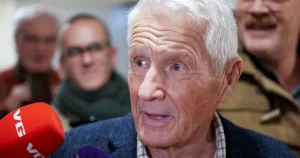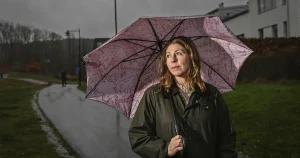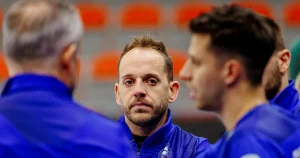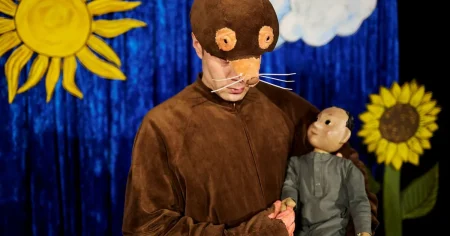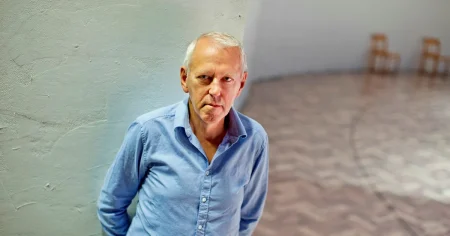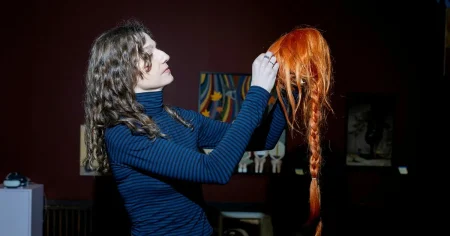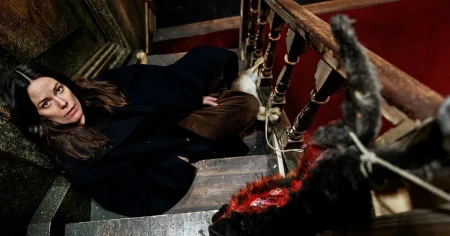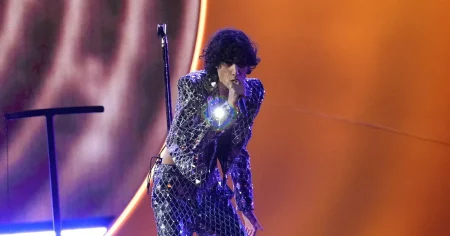Emma Knyckare, the seemingly ever-optimistic comedian, is the focus of this profile. The piece opens with a failed attempt to uncover a hidden darkness, a “sad clown” narrative, which sets the tone for the subsequent exploration of Knyckare’s life and career. The writer admits their initial strategy of finding a melancholic undercurrent falls flat, as Knyckare consistently deflects probes into her personal struggles with humor and lightheartedness. The narrative then shifts to a chronological recounting of the interview, starting with Knyckare’s childhood and culminating in her current projects.
Growing up in the rural town of Rolfstorp, Knyckare discovered her comedic talent early, entertaining neighbors with rehearsed jokes gleaned from popular Swedish comedy shows. This desire to evoke laughter propelled her through an unfulfilling academic career and led her to the vibrant arts scene of Varberg’s high school. There, she found her niche in revues and sketches, a passion that would later define her professional life. Her talent blossomed further at Katrinebergs folkhögskola, although she found the school’s method acting approach, including exercises like being locked in an attic to induce panic, to be overly dramatic and ineffective. Nevertheless, the freedom to create her own comedic material solidified her path.
Knyckare’s career trajectory took a sharp upward turn with a competition win that landed her a performance slot at the Arvikafestival. This exposure caught the attention of the Malmö-based Humorklubben “Oslipat,” providing her a platform to hone her stand-up skills. The early 2000s witnessed a boom in Sweden’s stand-up scene, and Knyckare seized every opportunity, eventually landing a gig with Sweden’s national radio, P3. Starting with ”Morgonpasset,” she progressed to the satirical ”Tankesmedjan” and the charity event ”Musikhjälpen,” ultimately earning her own talk show, ”Knyckare i P3.” This success cemented her place in Swedish comedy.
The interview delves into Knyckare’s successful podcast ”Flashback Forever,” which she co-hosts with Ina Lundström and the semi-anonymous ”Scroll-Mia.” The podcast, which boasts over 100,000 weekly listeners, draws its humor from the often bizarre and controversial discussions found on the online forum Flashback. Knyckare describes the process of sifting through the forum’s darker content, filtering out the offensive material to find comedic gold. The podcast’s success, marked by a Guldörat award from the Radio Academy, has provided Knyckare with financial stability and creative satisfaction. She reflects on the podcast’s longevity, noting that it’s the longest she’s held a job outside of her time at Sveriges Radio.
Knyckare’s foray into activism with the Statement Festival, a women-only music festival created in response to a wave of sexual assaults at Swedish festivals, is also discussed. While the festival garnered international attention and sparked significant debate, it also faced criticism and legal challenges. Knyckare recounts the experience with characteristic resilience, admitting to feeling unaffected by personal attacks but expressing genuine vulnerability to criticism of her comedic abilities. The festival, though ultimately discontinued due to the pandemic, represents a significant moment in Knyckare’s career, highlighting her willingness to tackle complex social issues.
The article concludes by focusing on Knyckare’s current projects, primarily the ”Hahaha-revyn,” a comedic revue co-created with Sofia Dalén. Knyckare expresses her preference for smaller, more intimate venues, contrasting her production with the larger-scale, more mainstream revues that have recently gained popularity. This preference reflects a recurring theme in the interview: Knyckare’s commitment to authenticity and her resistance to compromising her unique comedic style for broader appeal. She expresses a desire to continue the ”Flashback Forever” podcast and hopes to expand her collaboration with Dalén, envisioning a series of revues. She also expresses her ambition to develop her own television program, viewing it not as a dream but as a natural progression in her career. Throughout the interview, Knyckare maintains a lighthearted and self-deprecating tone, consistently turning potentially serious topics into opportunities for humor. The writer ultimately concludes that, despite their initial expectations, there is no “sad clown” narrative to be found, only a comedian comfortable in her own skin, driven by a genuine desire to make people laugh.


